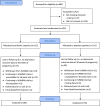Probiotics and Maternal Mental Health: A Randomised Controlled Trial among Pregnant Women with Obesity
- PMID: 31992802
- PMCID: PMC6987087
- DOI: 10.1038/s41598-020-58129-w
Probiotics and Maternal Mental Health: A Randomised Controlled Trial among Pregnant Women with Obesity
Abstract
Poor maternal mental health has been associated with a myriad of pregnancy and child health complications. Obesity in pregnancy is known to increase one's risk of experiencing poor maternal mental health and associated physical and mental health complications. Probiotics may represent a novel approach to intervene in poor mental health and obesity. We conducted this pre-specified secondary analysis of the Healthy Mums and Babies (HUMBA) randomised controlled trial to investigate whether probiotics would improve maternal mental health outcomes up to 36 weeks of pregnancy. Two-hundred-and-thirty pregnant women with obesity (BMI ≥ 30.0 kg/m2) were recruited and randomised to receive probiotic (Lactobacillus rhamnosus GG and Bifidobacterium lactis BB12, minimum 6.5 × 109 CFU) or placebo capsules. Depression, anxiety, and functional health and well-being were assessed at baseline (120-176 weeks' gestation) and 36 weeks of pregnancy. Depression scores remained stable and did not differ between the probiotic (M = 7.18, SD = 3.80) and placebo groups (M = 6.76, SD = 4.65) at 36 weeks (p-values > 0.05). Anxiety and physical well-being scores worsened over time irrespective of group allocation, and mental well-being scores did not differ between the two groups at 36 weeks. Probiotics did not improve mental health outcomes in this multi-ethnic cohort of pregnant women with obesity.
Conflict of interest statement
The authors declare no competing interests.
Figures
References
-
- Wardrop AA, Popadiuk NE. Women’s experiences with postpartum anxiety: Expectations, relationships, and sociocultural influences. Qual. Rep. 2013;18:1–24.
Publication types
MeSH terms
LinkOut - more resources
Full Text Sources
Medical


